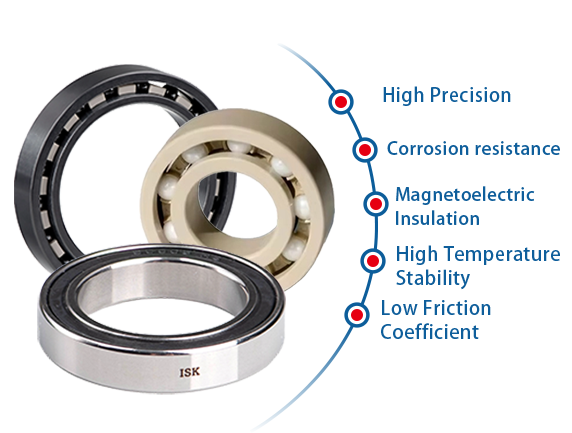Need Support?
Please provide your question. We’ll find you with the best support options.
.png)
 There are four main types of ceramic materials used in bearings:
There are four main types of ceramic materials used in bearings:(1) Zirconia (ZrO2)
(2) Silicon Nitride (Si3N4)
(3) Silicon Carbide (SiC)
(4) Aluminium Oxide (Al2O3)
Each of these materials possesses excellent properties that allow ceramic bearings to perform exceptionally well in specific application environments.
 Ceramic Bearing Material Properties:
Ceramic Bearing Material Properties:Ceramic bearings have superior chemical and corrosion resistance, allowing them to operate in more extreme environments and be less affected by thermal expansion and contraction compared to conventional materials. This enables them to maintain bearing clearance and function effectively in environments with significant temperature fluctuations.
Compared to standard bearings, ceramic bearings offer higher corrosion resistance, hardness, high-temperature stability, and reduced weight.
 Engineered Plastic Bearings come in various material types:
Engineered Plastic Bearings come in various material types:ISK Bearings' engineered plastic bearings are precisely manufactured with inner and outer rings made of POM, PP, PTFE, PVDF, PEEK, and other engineering plastic materials. They can be equipped with Si3N4 ceramic balls, ZrO2 ceramic balls, glass balls, or stainless steel balls, making them suitable for environments requiring precision, corrosion resistance, and oil-free lubrication. The use of these advanced materials bearings new possibilities for bearing performance and industrial equipment applications.
 Material Properties of Engineered Plastic Bearings:
Material Properties of Engineered Plastic Bearings:Engineered plastic bearings exhibit a wide range of material properties:
(1) POM (Polyoxymethylene) and PA (Polyamide) offer good mechanical strength and wear resistance, making them suitable for high-temperature environments ranging from approximately -55℃ to 100℃. PP (Polypropylene), HDPE (High-Density Polyethylene), and UPE (Ultra High Molecular Weight Polyethylene) are suitable for most acidic and alkaline environments and possess self-lubricating properties without the need for oil.
(2) PTFE (Polytetrafluoroethylene) and PVDF (Polyvinylidene Fluoride) provide the best chemical resistance.
PEEK (Polyetheretherketone) and PI (Polyimide) are modern engineering plastics with PEEK capable of continuous use at temperatures up to 260℃ and PI up to 300℃. Both have excellent corrosion resistance, making them ideal for complex acidic and alkaline environments.
(1) Additionally, PEEK offers extremely high thermal stability, high rigidity, and hardness.
(2) PTFE is known for its chemical corrosion resistance, low friction coefficient, and excellent electrical insulation properties.
(3) HDPE offers good electrical insulation and is easy to weld, with a working temperature range of -50℃ to +90℃, while PVDF can operate within a temperature range of -60℃ to +150℃.
Please provide your question. We’ll find you with the best support options.